How can we sensitize people to climate change when they are “just so busy managing their daily lives?”
Busyness is a disease of the modern world, and particularly the Western world today. Our lives are so crowded with many conflicting sources of information, it becomes very hard to know who we can trust on these issues. Many people are also struggling to get by, with mortgages to pay, children to raise, homes to run and jobs to keep. I know myself as a working mom just how hard it is to keep all the balls in the air! The last thing I or anyone else needs at the end of a busy day is a sense of guilt — that we are not doing enough, that we don’t care.
In this busy world, the only way to reach people is through sharing stories about how climate change is affecting people directly, and importantly, what they are doing about it. I have realized that there is one story which is more powerful than any other if we share it: our own. That is why I decided to write Climate Generation.
Why do people who would do everything to protect their children ignore the warning signs?
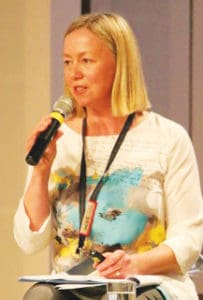
I think a number of things are at play here. Apart from the busyness and the noise in our lives, there is also a very serious issue of who to trust on this topic. For some time, there has been confusion over the veracity of the science, whether this is really happening, whether it is serious or not. Many people are perhaps lulled into a false sense of security by media sources or some institutes.
This has been perpetuated by a false sense of need for balance in the debate. Yet well over 99% of respected climatologists listed by the International Panel on Climate Change, recognize that this is extremely serious. In fact, the International Union of Scientists has twice put the world on last warning on climate change. Despite this, there are those who have vested interests, who still sew division and delay among people.
Here’s a parallel with the way we accept the science around human health. We accept now that smoking causes lung cancer. Scientists say this with 95% confidence: the same level of confidence they have that CO2 causes climate change.
Or to use another analogy, it is like 99 doctors saying you require an urgent operation to remove a tumor, but you decide you will go with the one who says you will be fine. I would say that people are still not convinced that this is really happening because they are not sent the right signals.
What keeps people and politicians from taking steps toward renewable energy sources or eco-friendly products?
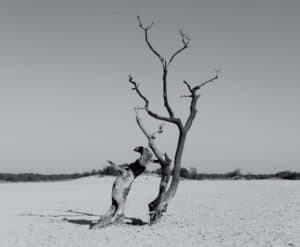
It is a very complex question. On a personal level, there is strong evidence of a disconnect between what people know about ecological issues and their actions. Psychologists call this
“cognitive dissonance.” While on one level people know our actions are destructive — they may even see the evidence with their own eyes — they find it extremely hard to change that behavior.
In many ways, our destructive environmental behavior has many of the same hallmarks of addiction. There is also a very serious issue of people not having the right information about the crisis we are facing. Schoolchildren, in fact, are better informed than the current generation of adults. This is not because they are super-intelligent, but simply because they are more up-to-date on the science.
From a political level, many countries face a situation where those who have most to lose from a shift to a low-carbon world are extremely powerful and well-organized. In the U.S., for example, the fossil fuel industry spends inordinate amounts of money lobbying in favor of delaying transition and sowing misinformation in the form of think tanks.
In Ireland, a similar situation exists in relation to the power of the beef and dairy industry, which will need to transition away from high methane production. In other countries, it is the mining industry or the car industry. This political interference has become a real crisis in recent years as the time to act has become more pressing.
It’s tough for a lot of people to give up what they love — for example, red meat. What helps here to make change happen?
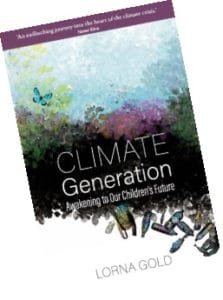 It is indeed a big sacrifice, but it helps to put it in perspective. If you really understand what is at stake for the next generation — their future on a livable planet — then the little things like giving up meat really matter. After all, we all love our children more than a steak or a holiday.
It is indeed a big sacrifice, but it helps to put it in perspective. If you really understand what is at stake for the next generation — their future on a livable planet — then the little things like giving up meat really matter. After all, we all love our children more than a steak or a holiday.
That is not to make light of these decisions. In my own family, we have not yet totally given up red meat, but we have cut it down to once or twice a month. We have agreed on “meat free” days and substituted meat products for non-meat alternatives.
As the main cook, I have found these small climate-friendly steps very empowering. I realized I have choices and I can change what I do. It takes a little more time, but it is great to see the family engage too!
A great opportunity also exists in connecting with others on social media. Until I started looking for a more ecological family-life, I was totally unaware of how much support and resources exist online.
I engaged with a local group called Zero Waste and found dozens of other local moms and dads who are keen to bring their children up without consumerism. We meet regularly
and have now even started our own “FridaysForFuture” climate action in the local town square. Many others have joined us and we have realized we can do so much.
How can we balance economic growth with mitigation?
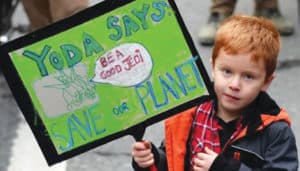 People always fear for their jobs… First of all, there is ZERO economic growth on a dead planet! There are no jobs on a dead planet. If we continue to destroy the planet that gives us everything, we will soon realize this.
People always fear for their jobs… First of all, there is ZERO economic growth on a dead planet! There are no jobs on a dead planet. If we continue to destroy the planet that gives us everything, we will soon realize this.
Like the old proverb goes, “It is only when the last tree dies that we will realize we cannot eat money.” This is often forgotten when we talk about economics and climate mitigation. The cost of inaction, both economically and socially, is huge and mounting fast.
In terms of economic growth, the main thing to recognize is that in a low- carbon world, there will be winners and losers — in terms of sectors which survive and those that have to be phased out.
This is why we talk about a “just transition.” There needs to be a process of managed transition away from high carbon-emitting sectors, such as fossil fuels, heavy industry — and where the future jobs will be, such as in renewable energy, circular economy.
It has to be planned. Plans like the Green New Deal which have been proposed are examples of the scale and ambition required to address the challenge of reconciling a viable economic future and climate mitigation.
Climate change is slow, and sometimes it is difficult to discern whether a blossoming tree in December is just a single event or a sign of a bigger alteration. How can people who don’t believe in climate change become aware of it?
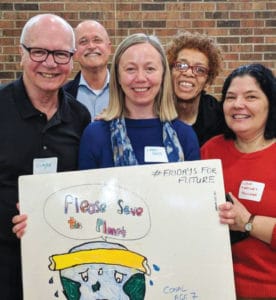 People don’t readily understand the difference between climate and weather. Weather is our day-to-day experience. Climate is the averages of weather over a thirty-year period or longer. There are always extreme weather events happening — since our weather system is all about balance, imbalance, correction and so on. It is a very complex system.
People don’t readily understand the difference between climate and weather. Weather is our day-to-day experience. Climate is the averages of weather over a thirty-year period or longer. There are always extreme weather events happening — since our weather system is all about balance, imbalance, correction and so on. It is a very complex system.
However, what climatologists can tell us is the probability of certain extreme weather events happening based on different atmospheric conditions such as CO2 concentrations. They can do this using computer modeling, which has developed exponentially in recent years. This modeling is telling them that the “once-in-a-hundred-year” events such as catastrophic flooding, extreme heat events and so on, are happening with ever-increasing frequency.
This is due to the rising concentration of greenhouse gases, which in turn have been put into the atmosphere by human activities. This is beyond doubt in terms of climatology, even though a small number may question the degrees of urgency and exact timelines.
How can we resist the pessimistic and paralyzing view that our small changes won’t matter if laws and companies don’t change?
Here I would point to the actions of one young woman, Greta Thunberg, who experienced the full force of this paralysis. In her early teens, she sank into a deep depression. It is easy for this to happen, as the magnitude of the change is so big and we as individuals are so small.
Yet that same girl decided to start a climate strike — to focus everyone’s attention on climate action — and it has sparked strikes all over the world. Her mantra is that “hope comes when you act, and only then.” That has become my mantra too.
Lorna Gold
From Living City, USA, April 2019




